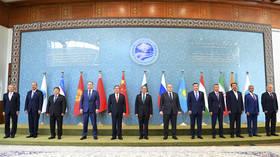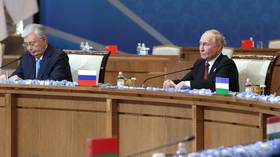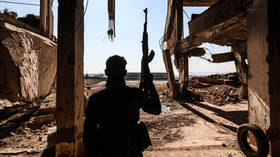Eurasian dilemma: Can this platform help two nuclear-armed neighbors start talking again?

At the 23rd meeting of the Council of Heads of Government of the Shanghai Cooperation Organisation (SCO) in Islamabad, Pakistan on Wednesday, two guests stood out: Iran’s First Vice President Mohammad-Reza Aref and India’s Minister of External Affairs Subrahmanyam Jaishankar.
While Iran’s choice makes sense, given that the country does not have a prime minister, the absence of Indian Prime Minister Narendra Modi from the event poses an intriguing question.
The answer, however, is rather straightforward. India-Pakistan relations are at a low ebb. Hopes for renewed dialogue, which emerged after Modi came to power in 2014, largely evaporated following the Uri and Pulwama attacks in Kashmir in 2016 and 2019, respectively, as well as the revocation of the special status of the Indian state of Jammu and Kashmir by the Modi-led government in 2019.
Consequently, the leadership of both countries has been cautious about making friendly gestures towards their ‘archrival’.
The deteriorating state of India-China relations, especially after their troops clashed in Galwan Valley in 2020 with casualties on both sides, also complicates matters. Given India’s perception of Pakistan as a client state of China, Modi’s visit to Islamabad would likely be seen by the Indian public as a concession to both adversaries.
Some experts argue that the absence of a member state's leader from the organization’s summit highlights the ineffectiveness of the SCO. However, two key points should be considered before drawing conclusions.
Firstly, Dr Jaishankar is not a minor player in Indian politics. Although the influence of the minister of external affairs has varied throughout India’s history (based on the configuration of the Indian elites), the officeholder has always been part of the prime minister’s inner circle and played a direct role in decision-making processes.
Thus, claims that the Indian leadership is becoming less interested in the SCO format due to Pakistan’s presence within the organization seem exaggerated. Secondly, the effectiveness of the SCO should be evaluated based on the objectives set by the organization, which have evolved over the years.
Setting the agenda
The SCO has existed for nearly three decades, and has served three distinct purposes: to act as a platform for resolving border disputes, to combat non-traditional security threats, and act as a forum for shaping the foundations of Eurasian security – and, more broadly, a multipolar world order.
The SCO’s initial function was to settle border disputes among its five founding members, or the “Shanghai Five” – Russia, China, Kazakhstan, Kyrgyzstan, and Tajikistan. The representatives of these nations laid the groundwork for the SCO format during a summit in Shanghai in 1996. The organization became official after Uzbekistan joined it in 2001, transforming the “Shanghai Five” into the “Shanghai Six.”
By 2011, all territorial issues had been resolved, allowing the SCO to shift its focus to other matters. With India and Pakistan joining as full members in 2017 and Iran in 2023, the organization’s significance in the region – and the world – has increased. The group now represents over 40% of the world’s population and over a quarter of global GDP.
The organization then focused on the fight against the “three forces of evil”: terrorism, extremism, and separatism. The Regional Anti-Terrorist Structure (RATS), which oversees counter-terrorism exercises for intelligence and law enforcement agencies, became responsible for countering these threats. Additionally, SCO member states conduct joint border operations and military anti-terrorism drills.
Finally, in recent years, the SCO has often been presented as a platform for discussing security issues. Russia has emphasized the role of the SCO in ensuring Eurasian security, expressing hope that the “Shanghai spirit” could spread throughout the continent and reduce the likelihood of future conflicts.
This is Russia’s perspective, but does it align with India’s and Pakistan’s vision of the organization’s objectives?
The tale of two neighbors
In the case of India and Pakistan’s membership of the SCO, issues arise at the very base level of why this group exists: the resolution of territorial disputes. While Kashmir is not the only point of contention between New Delhi and Islamabad, this particular border dispute significantly impacts the overall dynamics of India-Pakistan relations and, importantly, their ability to collaborate effectively within the SCO.
Unfortunately, the chances of a positive outcome are slim. Both sides have unshakeable faith in their own righteousness, and their arguments have been honed over decades. Neither Indian nor Pakistani elites are willing to make concessions on this issue.
Moreover, as a discussion platform, the SCO cannot help New Delhi and Islamabad resolve the dispute, since the Shimla Agreement of 1972 and the Lahore Declaration of 1999 explicitly exclude any third-party involvement in bilateral issues between India and Pakistan.
The organization’s efforts to combat non-traditional security threats might seem like a good opportunity to foster cooperation between New Delhi and Islamabad, yet here too, their perspectives on regional security diverge in a major way. India distrusts Pakistan and accuses it of supporting militants in the India-administered Jammu and Kashmir. Islamabad, in turn, claims that India backs militants from Tehrik-i-Taliban Pakistan (the Pakistani Taliban) and the Balochistan Liberation Army.
While such mutual accusations do not prevent both sides from participating in joint anti-terrorism exercises under the auspices of the SCO, there is definitely no “Shanghai spirit” of mutual trust between them.
When it comes to the third key goal of the SCO, both Indian and Pakistani elites view the organization as a favorable platform for expressing their positions on regional and global security issues. They also support the SCO as a cornerstone of Eurasian security and a multipolar world.
However, New Delhi and Islamabad are concerned about the rise of confrontational (i.e. anti-Western) elements within the SCO, which could upset their partners in the US and Europe. As relations between the West and SCO member states (primarily Russia and China) become more strained, elites in India and Pakistan feel less inclined to invest their political capital in contributing to the development of the organization.
Discussion
Does all this mean that members of India and Pakistan in the SCO will hamper the organization’s progress in achieving its goals?
Firstly, despite the chances that the territorial disputes between New Delhi and Islamabad could be resolved successfully are quite slim, this doesn’t prevent both nations from engaging with the SCO in a form which they find acceptable.
It would be a great oversimplification to equate territorial disputes that existed among the “Shanghai Five” (made up of China, Russia, Kazakhstan, Kyrgyzstan and Tajikistan) with the Kashmir issue, and to conclude that negotiations between India and Pakistan have failed. Ultimately, the fact that both countries are members of the SCO could be helpful during any future escalations of the conflict.
Secondly, the security issues between India and Pakistan shouldn’t undermine the collaborative efforts they undertake to combat shared threats within the framework of the SCO. Participation in joint counter-terrorism drills may not drastically reduce mutual distrust between the leadership of the two countries, but it underlines the importance of maintaining communication between their military forces and intelligence agencies.
Thirdly, the reluctance to escalate political discussions within an organization focused on defense and security issues is also quite understandable. Russia’s proactive stance is clear: Moscow is in a rigid confrontation with the West and is promoting its vision of a more just world order, urging its partners to join the discussion. If they are not ready to support any of Russia’s propositions, it may be that conditions are not yet ripe for this. In any case, open pressure will certainly not accelerate the process.
It was hardly expected that the summit would yield significant breakthroughs. Foreign policy, as an area of activity, is generally characterized by inertia – once a course is set, it is very difficult to change it through sheer will. Therefore, such decisions must be measured and considered. It seems that the inclusion of India and Pakistan in the SCO falls into this category, and may eventually yield positive results – for both countries and for the organization in general.
















